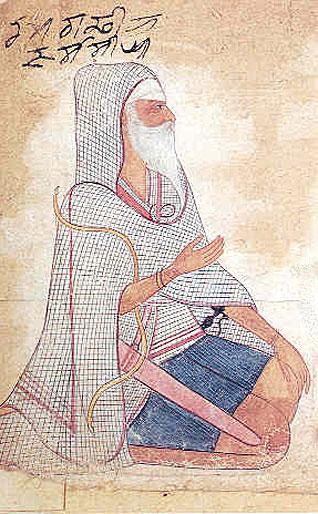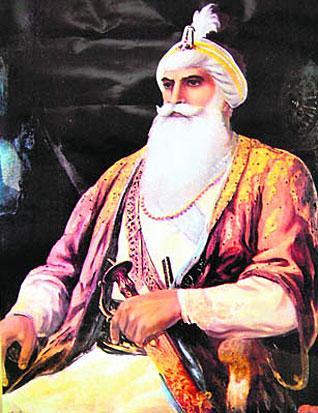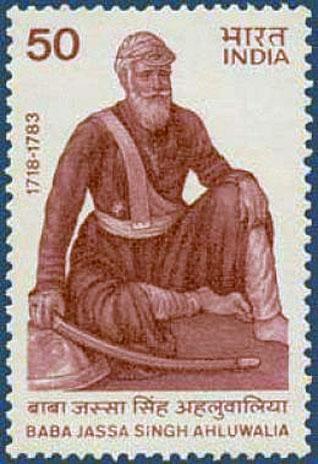Our Heroes
Nawab Jassa Singh Ahluwalia: Sultan of Punjab
by MOHINDER SINGH AHLUWALIA
Nawab Jassa Singh Ahluwalia was a legend in his own lifetime, which inspired the people of Punjab to fight against the tyranny and injustice of invaders and ruthless rulers. He was an embodiment of courage, bravery and self-sacrifice.
This great son of Punjab was born on May 3, 1718, in Ahlu village, near Lahore in West Punjab. His father, Badar Singh, died when he was only five.
Jassa Singh, along with his mother, went to Delhi to live under the care of Mata Sundri, the widow of Guru Gobind Singh. Mata Sundri brought him up affectionately. He studied Persian, Arabic, Sikh scriptures and mathematics at Delhi. He lived there for about seven years. On his departure from Delhi, Mata Sundri blessed him and predicted that he would become a worthy leader of the Sikhs.
On his arrival in Punjab, Jassa Singh joined Nawab Kapur Singh, who was the most powerful and supreme leader of the Sikhs. Jassa Singh's personal valour, cool judgment and other qualities created a deep impression on the Sikhs.
The different groups of the Sikh sangat - numbering about 65 - met at Amritsar first in 1746, and then in 1748, and formed the Dal Khalsa consisting of 11 misls (confederacies).
Jassa Singh was declared the head of the Ahluwalia misl and supreme commander of the Dal Khalsa. Kapur Singh, before his death in 1754, appointed him successor, and he was given the title of Nawab.
In January, 1746, a jatha of the Dal Khalsa led by Jassa Singh was moving through the Shivalik hills. Diwan Jaspat Rai of Lahore, along with his royal army, chased the jatha members and trapped them. During this battle, Jaspat Rai was killed. Diwan Lakhpat Rai, the brother of Jaspat Rai, pledged to take revenge of his brother's death. Lakhpat Rai, under the orders of Yahya Khan of Lahore, launched a big battle against the Sikhs.
The royal forces started a general massacre of the Sikhs in Lahore, and afterwards in Khanuwan village. Thousands of Sikhs were killed. The Sikhs suffered heavy losses. This period is known as the Chhota Ghallughara (the Small Holocaust).
In March, 1761, the King of Afghanistan and Persia and one of the supreme conquerors of his time, was returning to his country victorious after defeating the Maratha power at Panipat. He took along with him 2,200 Hindu women for selling them in Kabul. Nawab Jassa Singh, along with the Dal Khalsa, rescued these women and then escorted them to their families.
In 1761, Jassa Singh and his forces attacked and occupied Lahore. Elated at his success, the Khalsa honoured Jassa Singh with the title of Sultan-ul-Quom.
Ahmad Shah Abdali made nine incursions into India from 1747 to 1769. He destroyed the Mughal Empire and gave a crushing defeat to the Maratha power.
During all these invasions, the Dal Khalsa always resisted his attacks on the Sikhs and Punjab, and actually managed to retrieve much of his booty. Abdali was upset with the Dal Khalsa. In February, 1762, he came to India to teach a lesson to the Sikhs. He overpowered the Sikh army near Kup village and carried out a full-scale massacre. About 25,000 to 30,000 Sikhs were killed. This battle is known in history as the Vadda Ghallughara (the Great Holocaust).
Jassa Singh Ahluwalia sustained 22 wounds on his chest.
In 1764, he, along with other Sikh sardars, marched to Sirhind. Zalim Khan, Governor of Sirhind, was killed. The Dal Khalsa razed Sirhind. Jassa Singh got Rs 9,00,000 cash as his share of the Sirhind treasury, and promptly donated the entire amount for the kar seva of Darbar Sahib. The kar seva was carried out under his supervision. The gurdwara of Fatehgarh Sahib was also built by him.
Jassa Singh never took undue advantage of his high position, and was not greedy. In 1779, at the end of his life, his wrested Kapurthala from Rai Ibrahim and became the founder of the Kingdom of Kapurthala.
After the execution of Baba Banda Singh Bahadar, the Sikhs were in great shock. The Mughals, in conjunction with some local Hindu elements, had issued an edict that all Sikhs were to be slaughtered. All types of atrocities and cruelties were committed on them. This period is called the period of struggle. The Sikhs had to run away to jungles, mountains and the wilderness for refuge. In these dark times, Jassa Singh Ahluwalia provided leadership to the Sikhs.
The Dal Khalsa, under the leadership of Jassa Singh Ahluwalia, inflicted humiliating defeats on Nadir Shah, Mir Mannu, Adena Beg, Zakria Khan, Salabat Khan and Jahan Khan.
The Sikh leader was a fearless military general, a shrewd politician and a patriot. He did more than any contemporary Sikh to consolidate the power of the Khalsa. He helped the Sikhs in the formation of independent Sikh states.
Jassa Singh Ahluwalia died in 1783, and his body was cremated in Amritsar near Baba Atal. In spite of his supreme sacrifices for over 40 years, he did not claim any privileged status for himself. He lived, fought and died for his beloved country, Punjab.
[May 3, 2009]
Conversation about this article
1: Sukhdev Singh Shergill (Kuala Lumpur, Malaysia), May 07, 2009, 11:18 PM.
The title 'Sultan-ul-Quom' shows that Jassa Singh Ahluwalia lived, fought and died for his Quom - Sikhs, not for Punjab, as indicated by the writer. It is a paradox on the part of the writer to state (rightly) that Jassa singh Ahluwalia was procalimed as Sultan-ul-Quom and then, he reduces this great son of Guru Gobind Singh into 'Sultan of Punjab' in the title of this article. When are we Sikhs going to work for our Quom instead of being slaves to brahmins? Being the tools of brahman chicanery?





